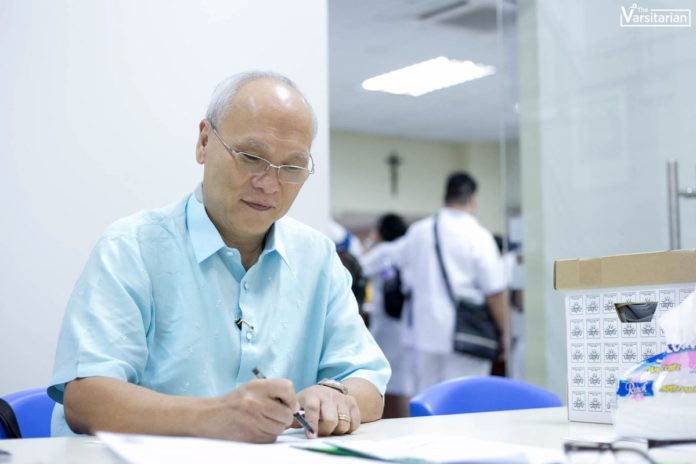LEADERS of the 1,900-strong faculty union and the University administration have agreed on a scheme to distribute P81.8 million in tuition hikes since 2014, with UST getting back a huge chunk to pay for incentives to higher-ranked professors whose loads were reduced because of the K to 12 transition.
Dr. George Lim, president of the UST Faculty Union, told the Varsitarian P26.8 million would soon be distributed to qualified faculty members in lump sums, as follows:
– P28,000 for tenured/full-time faculty members;
– P10,000 for tenured/part-time faculty members;
– P2,000 for non-tenured/full-time faculty members; and
– P1,000 for non-tenured/part-time faculty members.
Only P26.8 million was left for distribution, Lim explained, as UST had to deduct P55 million, spent on incentives for professors and associate professors affected by the three-unit teaching load reduction implemented by UST, and adjustments in the pay of faculty members from Civil Law, the Graduate School and the Junior High School.
The entire amount of P81.8 million represents the share of faculty members in tuition hikes collected for Academic Years 2014 to 2015 and 2015 to 2016.
Lim recalled that the union and the administration agreed to reduce the maximum teaching load to 21 units per term from 24 units, without salary cuts, during negotiations for the 2011-2016 collective bargaining agreement (CBA) which lays down employment terms and conditions.
Assistant professors got the incentive starting last year, after the professors and associate professors. It’s the turn of the instructors to get the three-unit incentive this year.
This was to help avoid layoffs during the transition to the K to 12 reform, which has disrupted enrollment in colleges and universities because of the imposition of an additional two years of high school.
The latest deal is a renegotiation of the economic benefits supposed to happen midway into the 2011-2016 CBA, which was delayed.
READ: UST Faculty Union ratifies new CBA
There are no changes to the salary rates paid per unit to faculty members, Lim said.
“We did not distribute the amount and put it as a salary increase, because the salary increase, once placed in the salary, it’s a continuous thing,” he said.
“What we thought would be the best for the union and the faculty members would be to distribute [the money] as a lump sum, just one amount. So next school year, the amount is still there and will have to be distributed,” he added.
To sweeten the deal, the administration agreed to grant signing bonuses of P10,000 to full-time faculty and P5,000 to part-timers.
As a result, 1,551 out of the union’s 1,912 members ratified the CBA renegotiation deal, while 124 members disapproved and 236 abstained.
“The signing bonus is given by the University. It is some sort of goodwill for the passage, [for the] ratification,” Lim said.
Deal hit
Lawyer Danielito Jimenez, president of the Arts and Letters Faculty Association, said the three-unit incentive should have been shouldered by the administration, not charged to tuition hikes.
READ: Faculty union dispute brewing
“Allowing the rank incentive benefit to be appropriated from the tuition increase share effectively violates the Labor Code against non-diminution of benefits of the faculty members who hold at least a rank of Associate Professor 1,” Jimenez said in a grievance complaint.
Lim, however, insisted that charging the three-unit incentive to tuition hikes “was already agreed upon in 2014 by [the union] and the University.”
“The union panel made our own mechanism to help the University, because we did not want layoffs because of the lack of students,” Lim said.
“Our only condition was that the [tuition increase] should be higher because the [tuition increase] will fund this,” he added.
The tuition hike for Academic Year 2017 to 2018, at 7.02 to 9.96 percent, was higher compared with the 2.5- to 5.3-percent tuition hike two years ago.
By law, 70 percent of tuition increases must go to salaries, wages, allowances, and other benefits of teaching and non-teaching personnel; while 20 percent to the improvement or modernization of buildings, equipment, libraries, laboratories, and similar facilities, and payment for other operational costs.
The remaining 10 percent represents return of investments for higher educational institutions if they are stock corporations. Otherwise, it must be used for operations.
‘No posting of signed deal’
Jimenez also pointed out that the renegotiation deal for the 2011-2016 CBA was not presented to union members, in violation of the Labor Code.
“It seems that the rule was disregarded as no posting of the duly signed renegotiated CBA was made at all. None of us have seen the supposed signed and renegotiated CBA,” Jimenez told the Varsitarian.
Under the law, signed copies of the CBA must be posted at least five days before ratification in two conspicuous areas.
Copies of the CBA renegotiation deal were distributed to faculty clubs on Sept. 20.
Appointed, not elected
Former union vice president Rene Tadle is also opposing the deal, saying it should have been presented first to a general assembly before it was ratified.
Tadle also questioned the right of the union panel to make decisions as some of the members, including Lim, were only appointed, not elected.
“The [constitution and by-laws] requires that the negotiators are duly elected by the general membership before they qualify to negotiate for the union,” Tadle said in his letter to Lim dated Sept. 23.
Lim has called for a general assembly on Oct. 13 to vote on changes to the union’s constitution and by-laws, to allow the union board to appoint CBA negotiators instead of holding an election.
“If the new constitution and by-laws is not approved by two-thirds of the membership, then we will have to go back to the old or existing by-laws. In that case the [union’s] commission on elections will conduct an election for the CBA panel members of the union,” Lim said.
















